About So-Called Dollars
So-Called Dollars are medals approximately the size of a silver dollar that were struck to commemorate a U.S. historical event. Struck since the early 1800’s they fall into two categories, those associated with a major fair or exposition such as the 1892-1893 Columbia Exposition and those associated with an event in U.S. history such as the completion of the Erie Canal in 1826. In addition dollar-sized medals that are associated with the silver controversies, our national coinage or were actually designed as circulating media are also known as so-called dollars. Pieces were struck by the U.S. Mint as well as by private diesinkers. The following types of medals are not so-called dollars: military medals, religious medals, award medals, fraternal medals or advertising store card medals.
The history of collecting medals
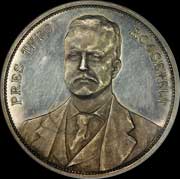
The term So-Called Dollar is credited to New York coin dealer Thomas Elder who used the term in one of his 1912 auction catalogs for the Louisiana Purchase Exposition silver President Roosevelt dollar HK 308. Richard D. Kenney authored an article on So-Called Dollars published in the July-August, 1953 edition of the Coin Collector’s Journal. In 1963 Harold E. Hibler and Charles V. Kappen published a book titled So-Called Dollars. A second edition of the Hibler & Kappen book was reprinted in 2008. That book today serves as the standard reference for So-Called Dollars. Numismatist Jeff Shevlin is currently researching and preparing to publish a new book on So-Called Dollars. Hundreds of collectors are collaborating with Jeff in that effort.
Early advanced U.S. collectors focused on rare medals and rare federal coinage. In the early 1900’s collectors focus changed to collecting U.S. coins by date and mint mark. Today many advanced numismatists are rediscovering the history and allure associated with rare medals. Their rarity and relatively low cost make them appealing today to knowledgeable collectors.
Browse So-Called Dollars by Exposition Category
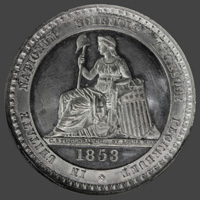
1853 New York Crystal Palace
New York City, New York
America's first foray into the promotion of the fruits of the industrial age followed the successful 1851 Great Exhibition in England. It showcased the industrial achievements of the world and demonstrated the nationalistic pride of a relatively young nation and all that America stood for. The English influence lead to the construction of an American version of the English Crystal Palace in iron and glass as the Grand Hall for the Exhibition. Two different so-called dollars were struck in various compositions for this exposition. The details for both are cataloged in my 2023 book So-Called Dollars Volume I: United States Expositions. Click on the “View All” link below to see them.
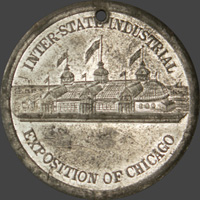
1873 Inter-State Industrial Exposition of Chicago
Chicago, Illinois
The disastrous fire of 1871 nearly brought the city of Chicago to it's knees, but leading businessmen fought back. The "New Chicago" would highlight its recovery and economic importance with the construction of the Inter-State Exposition Building that housed annual expositions from 1873 to 1890. The building was modeled after the Crystal Palaces of London and New York. One so-called dollar was struck for this exposition. The details are cataloged in my 2023 book So-Called Dollars Volume I: United States Expositions. Click on the “View All” link below to see it.
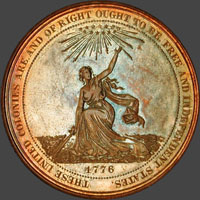
1876 U.S. Centennial Exposition
Philadelphia, Pennsylvania
America had come of age, and wanted to let the world know. The Centennial Exposition, the first official world’s fair in the United States, was held in Philadelphia, Pennsylvania, from May 10th to November 10th, 1876, to celebrate the 100th anniversary of the signing of the Declaration of Independence. 93 different so-called dollars were struck in various compositions for this exposition. The details are cataloged in my 2023 book So-Called Dollars Volume I: United States Expositions. Click on the “View All” link below to see them.
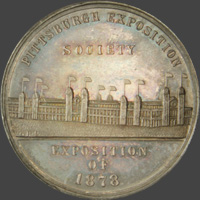
1878 Pittsburgh Exposition
Pittsburgh, Pennsylvania
The Pittsburgh Exposition Society organized its first fair in 1875 to build on the successes of Pittsburgh businesses in the U.S. and European expositions and trade fairs. One so-called dollar was struck in various compositions for this exposition. The details are cataloged in my 2023 book So-Called Dollars Volume I: United States Expositions. Click on the “View All” link below to see them.
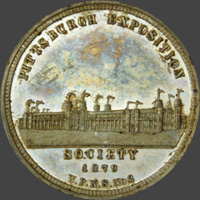
1879 Pittsburgh Exposition
Pittsburgh, Pennsylvania
The Pittsburgh Exposition was held annually beginning in 1875, but only for the years 1878 and 1879 were so-called dollar sized medals struck. One so-called dollar was struck in various compositions for this exposition. The details are cataloged in my 2023 book So-Called Dollars Volume I: United States Expositions. Click on the “View All” link below to see them.
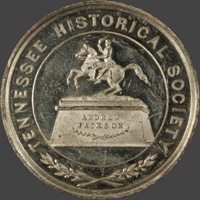
1880 Nashville Centennial Exposition
Nashville, Tennessee
One-hundred artillery guns placed on Capitol Hill fired at 6 AM to usher in Nashville's Centennial Day with a bang. Exhibits primarily from the southern states focused on local industrial products, farm produce and implements, and educational opportunities, exhibits focused on the geology and history of the south. One so-called dollar was struck for this exposition. The details are cataloged in my 2023 book So-Called Dollars Volume I: United States Expositions. Click on the “View All” link below to see them.
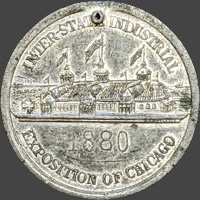
1880 Inter-State Industrial Exposition of Chicago
Chicago, Illinois
The Inter-State Industrial Exposition, held annually in Chicago for 18 years from 1873-1890, highlighted manufacturing products primarily from the Chicago area. The Exposition Building, built specifically for these expositions, was a glass and metal structure with ornamental domes, based on exposition buildings previously built in London and New York.
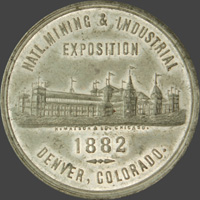
1882 National Mining and Industrial Exposition
Denver, Colorado
Planning began at the end of 1880 with a proposal for a permanent mining exposition grounds that would become a grand museum. The Director of the Denver Mint agreed to accept the position of Acting President to raise the stature of the endeavor. One so-called dollar was struck for this exposition. The details are cataloged in my 2023 book So-Called Dollars Volume I: United States Expositions. Click on the “View All” link below to see them. SH 3–42 was cataloged and published in the book but it has been removed because it was determined to be too small.
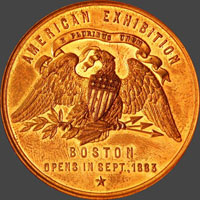
1883 American Expo of Foreign Products
Boston, Massachusetts
Americans had no opportunity to see the advances of foreign art and industry since the 1876 Centennial Exposition. Boston sought to capitalize on its status as an important port and the hub of eight railway lines connecting to the entire rail system of the US and Canada. 40 nations exhibited in two exhibit halls, reserved exclusively for foreign arts, products, and manufacturers. One so-called dollar was struck for this exposition. The details are cataloged in my 2023 book So-Called Dollars Volume I: United States Expositions. Click on the “View All” link below to see them.
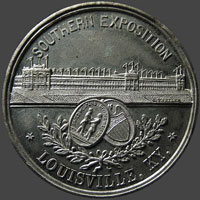
1883 Southern Exposition
Louisville, Kentucky
Expositions became popular as a means to promote Southern economic centers as they sought to recover from the consequences of conflict and defeat. Unlike Atlanta and Nashville, Louisville was not damaged during the Civil War. The major innovation feature was electricity. Louisville’s Southern Exposition was the first major event in the world, completely lit by light inside and out. Three so-called dollar was struck for this exposition. The details are cataloged in my 2023 book So-Called Dollars Volume I: United States Expositions. Click on the “View All” link below to see them.
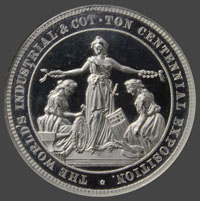
1884-85 World's Industrial and Cotton Centennial
New Orleans, Louisiana
One-third of all U.S. Cotton passed through the port of New Orleans in the early 1880s. The main exposition building was the largest exhibition hall constructed up to that point. Every state and all but one U.S. territory participated along with nine foreign countries. The U.S. government building included a mint exhibit where they struck white metal examples of the official medal SH 4–1 and, according to the official guidebook, U.S. silver, dollars, presumably, with an O mint mark. 18 different so-called dollars were struck in various compositions for this exposition. The details are cataloged in my 2023 book So-Called Dollars Volume I: United States Expositions. Click on the “View All” link below to see them.
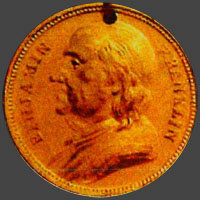
1884 International Electrical Exposition
Philadelphia Pennsylvania
Philadelphia’s Franklin Institute, organized and hosted this event, which was the first great electrical exposition held in United States. There were 196 commercial exhibitors and over 1500 exhibits, including an exhibit of the historical items used by Benjamin Franklin. The Edison Electric Light Co. had an exhibit of house lighting.
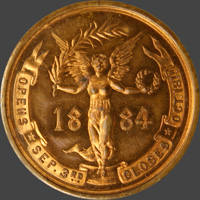
1884 St. Louis Exposition
St. Louis, Missouri
St. Louis Merchants resolved in early 1883 that it would be advisable for the city to develop an exposition if the city intended on retaining its position as one of the leading commercial centers of the West. To do so, they determined that an exhibition hall be built in combination with the city’s annual Music Festival. One so-called dollar was struck in various compositions for this exposition. The details are cataloged in my 2023 book So-Called Dollars Volume I: United States Expositions. Click on the “View All” link below to see them.
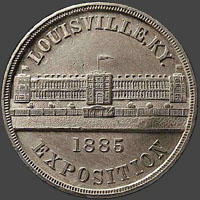
1885 Southern Exposition
Louisville, Kentucky
Louisville held five expositions between 1883 and 1887, in the same location. So-Called Dollars were struck for the first exposition held in 1883, and for this exposition held in 1885, but they were not struck for the other years the exposition was held. One so-called dollar was struck in various compositions for this exposition. The details are cataloged in my 2023 book So-Called Dollars Volume I: United States Expositions. Click on the “View All” link below to see them.
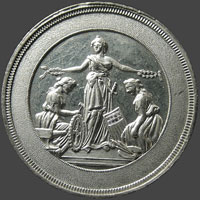
1885 St. Louis Enterprises Exposition
St. Louis, Missouri
At the exposition, the St. Louis Bank Note Co. displayed steel plate engravings and engraving devices for making bank notes. Parson and Co., a local regalia manufacturer, exhibited examples of their badges and other forms of regalia produced for fraternal organizations. The official SCD SH 4–51 commemorate the exposition along with concurrent events. Two so-called dollars were struck in various compositions for this exposition. The details are cataloged in my 2023 book So-Called Dollars Volume I: United States Expositions. Click on the “View All” link below to see them.
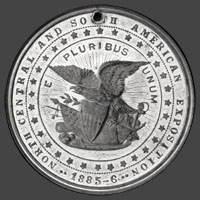
1885-86 North, Central and South American Exposition
New Orleans, Louisiana
The earlier New Orleans Cotton Centennial Exposition lost money, but local residents considered it a success. The North Central and South American Exposition open less than six months later, at the same location; the stated goal was to celebrate peace and goodwill among the three Americas. Three so-called dollars were struck in various compositions for this exposition. The details are cataloged in my 2023 book So-Called Dollars Volume I: United States Expositions. Click on the “View All” link below to see them.
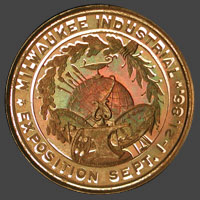
1886 Milwaukee Industrial Exposition
Milwaukee, Wisconsin
Milwaukee’s Exposition Building, featured on the reverse of the official so-called dollar, SH 4–61, opened in 1881. Regarded as the cities crown jewel at the time, the Queen Anne style brick building was constructed entirely with private funds. One so-called dollar was struck for this exposition. The details are cataloged in my 2023 book So-Called Dollars Volume I: United States Expositions. Click on the “View All” link below to see them.
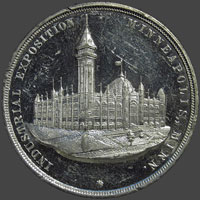
1886 Minneapolis Industrial Exposition
Minneapolis, Minnesota
The Minneapolis Industrial Exposition originated when the cities prominent citizens felt slighted by the selection of its twin city, Saint Paul, as the permanent home for the Minnesota State Fair. The industrial title was a deliberate choice to stand in contrast to the agricultural state fair. Five so-called dollars were struck in various compositions for this exposition. The details are cataloged in my 2023 book So-Called Dollars Volume I: United States Expositions. Click on the “View All” link below to see them.
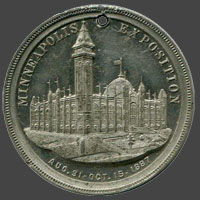
1887 Minneapolis Industrial Exposition
Minneapolis, Minnesota
The Minneapolis newspaper the Star Tribune posed the rhetorical question on September 1, 1887: “What can you see at the Exposition? Everything that marks the progress of mankind.“ Three so-called dollars were struck in various compositions for this exposition. The details are cataloged in my 2023 book So-Called Dollars Volume I: United States Expositions. Click on the “View All” link below to see them.
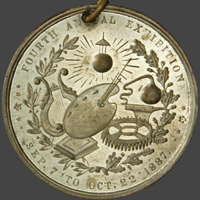
1887 St. Louis Exposition
St. Louis, Missouri
The Fourth Annual St. Louis Exposition opened on the evening of September 7, 1887. News reports noted the expectation of a large turnout, as the Grand Army of the Republic planned an encampment and President Cleveland and his wife planned to visit during opening week. An estimated 20,000 visitors turned out to see the exhibits and the band entertainment in the Music Hall. One so-called dollar was struck for this exposition. The details are cataloged in my 2023 book So-Called Dollars Volume I: United States Expositions. Click on the “View All” link below to see them.
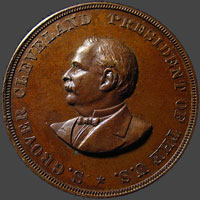
1887 Piedmont Exposition
Atlanta, Georgia
President, Grover, Cleveland, celebrated on the exposition so-called dollar, attended the exposition on a rainy day, October 19. The muddy ground kept them confined to their carriage as they reviewed the troops marching in deep mud. One so-called dollar was struck in various compositions for this exposition. The details are cataloged in my 2023 book So-Called Dollars Volume I: United States Expositions. Click on the “View All” link below to see them.
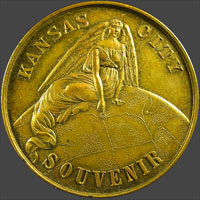
1887 National Agricultural Exposition
Kansas City, Missouri
The organizers of the National Agricultural Exposition intended the event to be “the grandest success as an exhibition of natural products that was ever held in America.“ The design of the building was inspired by the Crystal Palace in London. President Cleveland and his wife did attend as planned, but they have little time to actually do more than pass through the exposition grounds without inspecting the exhibits. The pair were making a whistle stop tour of the Midwest with just enough time to make a speech, engage the crowds, and then move on to the next stop. Three so-called dollars were struck in various compositions for this exposition. The details are cataloged in my 2023 book So-Called Dollars Volume I: United States Expositions. Click on the “View All” link below to see them.
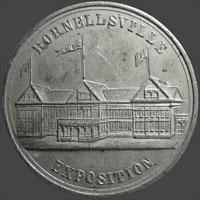
1887 Hornellsville Exposition
Hornellsville, New York
Hornellsville, a rural New York State farming community, held an annual exposition to promote local businesses in the farming community. Local merchants exhibited their wares, including bicycles, boots, shoes, and domestic household products. One so-called dollar was struck for this exposition. The details are cataloged in my 2023 book So-Called Dollars Volume I: United States Expositions. Click on the “View All” link below to see them.
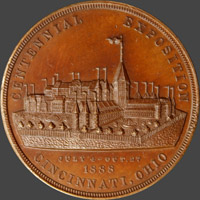
1888 Ohio Valley and Central States Centennial
Cincinnati, Ohio
Cincinnati traces its history to the first settlement on the banks of the Ohio River in 1788. As it grew rapidly, the city earned the curious name, “Mother of Expositions.“ Its strategic location on the river led to its early industrialization, and the First Merchants Institute Fair was held in 1838. The U.S. Government mounted their own displays minus the U.S. Mint, but local die sinking firms and medal artists made up for the Mint’s absence. Five so-called dollars were struck in various compositions for this exposition. The details are cataloged in my 2023 book So-Called Dollars Volume I: United States Expositions. Click on the “View All” link below to see them.
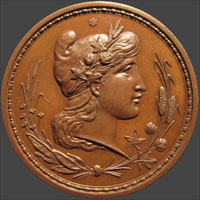
1888 Florida Sub-Tropical Exposition
Jacksonville, Florida
Exhibits at the 1888 Florida Sub-Tropical Exposition ran the usual gamut from the tropical plants of Florida and the West Indies, including the full range of the fruits grown in Florida, flowers, and farm crops. One so-called dollar was struck in various compositions for this exposition. The details are cataloged in my 2023 book So-Called Dollars Volume I: United States Expositions. Click on the “View All” link below to see them.
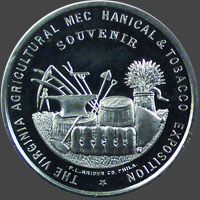
1888 Virginia Agricultural, Mechanical & Tobacco Exposition
Richmond, Virginia
Richmond city fathers considered Virginia to be historically the most interesting of the States of the Union, despite or possibly because it served as the capital of the Confederate States of America. Home to Washington, Jefferson, the Tylers, Madison and Monroe, the state prided itself on its claim to presidents and fathers of presidents. One so-called dollar was struck for this exposition. The details are cataloged in my 2023 book So-Called Dollars Volume I: United States Expositions. Click on the “View All” link below to see them.
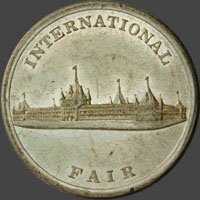
1888 Buffalo International Fair and Exposition
Buffalo, New York
A promotional brochure for the International Fair in Buffalo entices the potential visitor with the question “You remember the Centennial? This International Fair at Buffalo is to be the largest and grandest Exposition held the United States since then.“ The brochure goes on to state that it is to be more than a fair: “It is to be an Exposition, international in his character, of all the Arts and Industries in which the human race is engaged.“ One so-called dollar was struck in various compositions for this exposition. The details are cataloged in my 2023 book So-Called Dollars Volume I: United States Expositions. Click on the “View All” link below to see them.
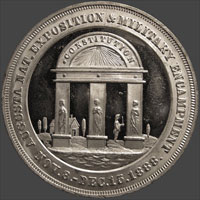
1888 Augusta National Exposition
Augusta, Georgia
The Augusta National Exposition brought together the National Agricultural Congress in showcasing the potential of Southern textile resources, as well as the untapped ability of the South to produce food products. In addition, the official medal celebrates the military encampment commemorating the Civil War. The Augusta Exposition was a success for the region, and it was just one of many held in the U.S. in 1888. One so-called dollar was struck for this exposition. The details are cataloged in my 2023 book So-Called Dollars Volume I: United States Expositions. Click on the “View All” link below to see them.
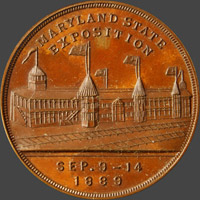
1889 Maryland Exposition
Baltimore, Maryland
The exposition highlighted the natural and industrial resources of “the Field; the Forest; the Mine; and the Waters of Chesapeake Bay.” President Benjamin Harrison open the event. The exposition celebrated the war of 1812 and the bombard of Fort McHenry in 1814. Four so-called dollars were struck in various compositions for this exposition. The details are cataloged in my 2023 book So-Called Dollars Volume I: United States Expositions. Click on the “View All” link below to see them.
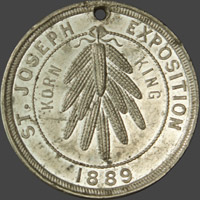
1889 National Railway Electric and Industrial Exposition
St. Joseph, Kansas
The people of St Joseph decided to host an exposition, popularly known as the "New Era Exposition" that would overshadow the Corn Palace in Sioux City, the Mineral Palace in Denver, the Grass Palace in Fort Worth, Texas and the Coal Palace in Ottumwa, Iowa. The exposition was held from September 3rd to October 3rd, 1889. One so-called dollar was struck for this exposition. The details are cataloged in my 2023 book So-Called Dollars Volume I: United States Expositions. Click on the “View All” link below to see them.
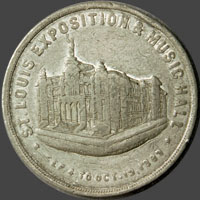
1889 St. Louis Exposition & Music Hall
St. Louis, Missouri
The sixth consecutive season of the St. Louis exposition open on September 5, 1889, making it the longest running local exposition in the U.S. One primary goal in 1889 was to secure the proposed 1892 World’s Fair that ultimately went to Chicago.
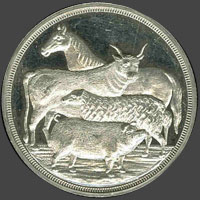
1890 Nebraska State Fair and Exposition
Lincoln, Nebraska
The Nebraska Exposition Association utilized the state fairgrounds for their exposition location. In addition to improving and adding new agricultural buildings, they also constructed a new exhibit hall for the arts, textiles, and education. Numerous improvements were made. Three so-called dollars were struck in various compositions for this exposition. The details are cataloged in my 2023 book So-Called Dollars Volume I: United States Expositions. Click on the “View All” link below to see them.
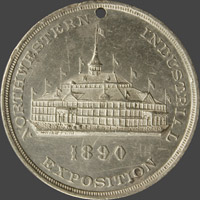
1890 Northwestern Industrial Exposition
Spokane Falls, Washington
The object of the exposition was to expose visitors to the riches of the region, without needing to make the arduous trips required to travel into the undeveloped mountain regions. In addition to the local resources, organizers sought to attract exhibits from the East to showcase the latest in manufactured goods and advancements in arts, to educate the local population, and encourage new industries in the Pacific Northwest. Perhaps the most ambitious and most spectacular exhibit was a working silver mine, with all the requisite tools and activities conducted by miners from the Idaho, Coeur d’Alene Silver District. One so-called dollar was struck for this exposition. The details are cataloged in my 2023 book So-Called Dollars Volume I: United States Expositions. Click on the “View All” link below to see them.
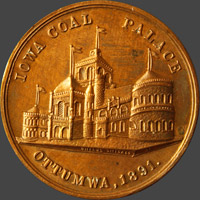
1891 Mineral and Industrial Exposition
Ottumwa, Iowa
The Iowa Coal Palace was built in Ottawa, Iowa in 1890 to showcase the local coal industry. Although better known for its agricultural products, extensive coal deposits were found in southern Iowa. President Benjamin Harrison visited the Coal Palace on October 9. He said the lesson of the Coal Palace was its illustration of the artistry and grace to be found in the common things of life. Two so-called dollars were struck in various compositions for this exposition. The details are cataloged in my 2023 book So-Called Dollars Volume I: United States Expositions. Click on the “View All” link below to see them.
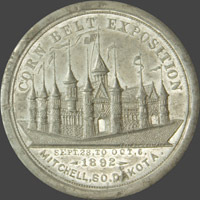
1892 Corn Belt Exposition
Mitchell, South Dakota
The popularity of unique buildings constructed of local agricultural crops spread throughout the Midwest in the late 1800s and 1900s. Mitchell, South Dakota built their own “corn palace“ for the Corn Belt Exposition in 1892. The goal was to promote the agricultural benefits of the rich soil of South Dakota, and to attract new settlers to the area. Three so-called dollars were struck for this exposition. The details are cataloged in my 2023 book So-Called Dollars Volume I: United States Expositions. Click on the “View All” link below to see them.
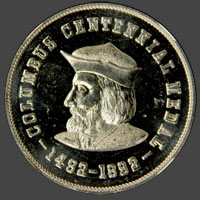
1892 Pittsburgh Exposition
Pittsburgh, Pennsylvania
The Western Pennsylvania Exposition Society of Pittsburgh was formed in 1885 to promote the cities industrial life. They selected land at the Point overlooking the meeting of the Allegheny, Ohio, and Monongahela rivers as the ideal location for the planned grounds and buildings. A merry-go-round was introduced in 1892 as entertainment for school children. One so-called dollar was struck for this exposition. The details are cataloged in my 2023 book So-Called Dollars Volume I: United States Expositions. Click on the “View All” link below to see them.
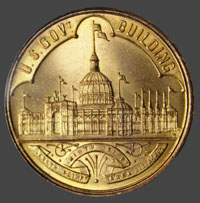
1893 World's Columbian Exposition
Chicago, Illinois
The 1893 Chicago World’s Columbian exposition was the ultimate showcase for many new inventions and marvels of the late 19th century. By the time the fair closed on October 30, 1893, a quarter of U.S. population had walked through with gates, over 27,500 people. The Fair encompassed, almost 700 acres of influential architecture, wonderful exhibits and novel entertainment. It was an awe-inspiring site. 181 so-called dollars were struck in various compositions for this exposition. The details are cataloged in my 2023 book So-Called Dollars Volume I: United States Expositions. Click on the “View All” link below to see them.
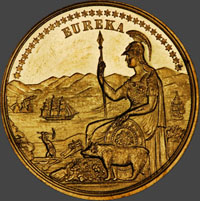
1894 California Midwinter International Exposition
San Francisco, California
Immediately following the 1893 Columbian Exposition, the California Midwinter Exposition was held in Golden Gate Park. Michael DeYoung, publisher of the San Francisco Chronicle, convinced the citizens of San Francisco to host the exposition with less than one year to build all of the buildings and complete the infrastructure. 34 so-called dollars were struck in various compositions for this exposition. The details are cataloged in my 2023 book So-Called Dollars Volume I: United States Expositions. Click on the “View All” link below to see them.
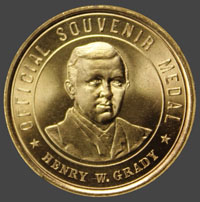
1895 Cotton States and International Exposition
Atlanta, Georgia
Resurgence rising again, declares Atlanta’s motto, as it appears on the official seal reproduced on several so-called dollars. The city that served as a key railroad, supply, and military center for the Southern armies during the Civil War was burned to the ground in the summer of 1864 by General Shermans Union army. The people rebuilt their city. Nine so-called dollars were struck in various compositions for this exposition. The details are cataloged in my 2023 book So-Called Dollars Volume I: United States Expositions. Click on the “View All” link below to see them.
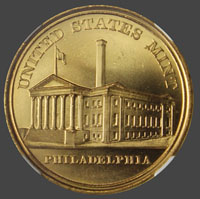
1896-97 Tennessee Centennial Exposition
Nashville, Tennessee
The Tennessee Centennial Exposition was held in Nashville for May 1 until October 30, 1897. The Exposition was originally scheduled to open almost one year earlier, on June 1, 1896, 100 years later to the date that Tennessee joined The Union. Over 100 structures were built, which ended up delaying the anticipated opening date. Four so-called dollars were struck in various compositions for this exposition. The details are cataloged in my 2023 book So-Called Dollars Volume I: United States Expositions. Click on the “View All” link below to see them.
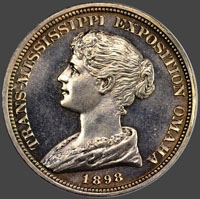
1898 Trans-Mississippi and International Expo
Omaha, Nebraska
The Trans-Mississippi and International Exposition was held in Omaha, Nebraska from June 1 to November 1, 1898. Over 2.6 million people viewed the 4000 plus exhibits during the five months it was open. Seven so-called dollars were struck in various compositions for this exposition. The details are cataloged in my 2023 book So-Called Dollars Volume I: United States Expositions. Click on the “View All” link below to see them.
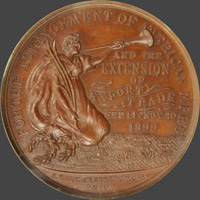
1899 National Export Exposition
Philadelphia, Pennsylvania
The primary goals of the National Export Exposition held in Philadelphia were to encourage and support American manufacturers and extend the United States trade relationships with foreign countries. Both of the so-called dollars known and cataloged for this exposition are well executed and future views of the Philadelphia Commercial Building, which was constructed for the exposition. Two so-called dollars were struck in various compositions for this exposition. The details are cataloged in my 2023 book So-Called Dollars Volume I: United States Expositions. Click on the “View All” link below to see them.
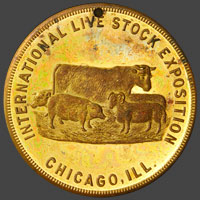
1900 International Stock Exposition
Chicago, Illinois
Chicago’s legendary Union Stock Yards revolutionized the meat packing industry in the late 1800s capitalizing on Chicago’s emergence as a national rail center. Industrial leaders conceived a livestock exposition to rival the largest held in England. The purpose of the exposition was to teach ranchers how to better feed and care for animals to produce better meat.
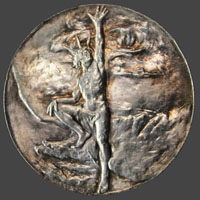
1901 Pan-American Exposition
Buffalo, New York
The exposition promised to be the largest since the Columbian Exposition. Pax 1901, for peace, the theme of the exposition, was shattered when President McKinley was assassinated at the Temple of Music on September 6, 1901. 13 different so-called dollars in various compositions were struck for this exposition. The details are cataloged in my 2023 book So-Called Dollars Volume I: United States Expositions. Click on the “View All” link below to see them.
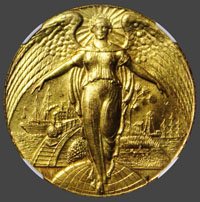
1901-02 South Carolina Inter-State and West Indian Exposition
Charleston, South Carolina
As with so many expositions, weakening trade inspired the South Carolina Inter-State and West Indian Exposition. The Liberty Bell was sent to Charleston for the exposition and it was only the fourth time the Liberty Bell was transported out of Philadelphia for display. The Bell had previously visited New Orleans, Chicago, and Atlanta. Celebrations were planned in the towns and villages along the route to cheer its passing. Bonfires, lanterns, and torches lit the rail lines at night to express reverence for this artifact of American freedom. Three so-called dollars were struck in various compositions for this exposition. The details are cataloged in my 2023 book So-Called Dollars Volume I: United States Expositions. Click on the “View All” link below to see them.
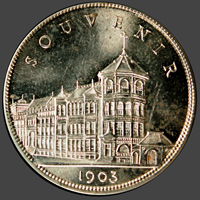
1903 Merchants and Manufactures 2nd Triennial Exposition
Boston, Massachusetts
The Boston Merchants and Manufacturers Exposition was held to educate people in the mercantile, manufacturing, and related arts and sciences. The exposition provided exhibits in which the best in every department of human industry could be illustrated by practical operations. One so-called dollar was struck in various compositions for this exposition. The details are cataloged in my 2023 book So-Called Dollars Volume I: United States Expositions. Click on the “View All” link below to see them.
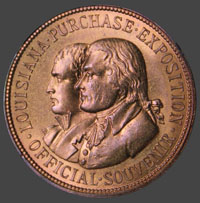
1904 Louisiana Purchase Exposition
St. Louis, Missouri
Meet me in St. Louis. The Louisiana Purchase Exposition drew almost 20 million visitors. Planned to celebrate the 1903 Centennial of the Louisiana Purchase, the scale of state and international participation delayed the opening until April 30, 1904. Numismatic promoter, Farrah Zerbe, secured the rights to sell the two U.S. gold dollars struck to commemorate the Louisiana Purchase. He also issued two smaller $1/2 and $1/4 sized gold, Fleur-de-lis’s medals. 33 so-called dollars were struck in various compositions for this exposition. The details are cataloged in my 2023 book So-Called Dollars Volume I: United States Expositions. Click on the “View All” link below to see them.
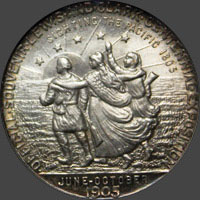
1905 Lewis and Clark Centennial Exposition
Portland, Oregon
On the 100th anniversary of the Corps of Discovery's exploration by Lewis and Clark in 1804 & 1805 of the Louisiana Purchase Territory and their sighting of the Pacific Ocean, Portland hosted this exposition. Farrah Zerby landed the contract to sell the U.S. commemorative gold dollars and promptly engaged in a new marketing scheme similar to that of the 1904 St. Louis Exposition, including producing two fractional gold pieces. 18 so-called dollars were struck in various compositions for this exposition. The details are cataloged in my 2023 book So-Called Dollars Volume I: United States Expositions. Click on the “View All” link below to see them.
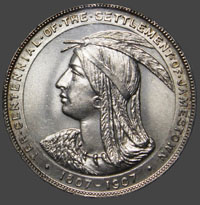
1907 Jamestown Tercentennial Exposition
Norfolk County, Virginia
The Jamestown Exposition celebrated the 300th anniversary of the first permanent English settlement of the colony of Virginia at Jamestown. Highlights found along the entertainment district, the Warpath, included a recreation of the 1906 San Francisco earthquake and the Civil War naval battle between the ironclad warships U.S.S Monitor and the C.S.S Virginia. Nine so-called dollars were struck in various compositions for this exposition. The details are cataloged in my 2023 book So-Called Dollars Volume I: United States Expositions. Click on the “View All” link below to see them.
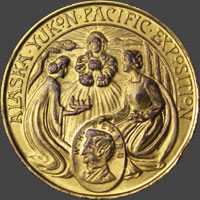
1909 Alaska-Yukon-Pacific Exposition
Seattle, Washington
Seattle hosted this exposition to celebrate the Alaskan Gold Rush and the discovery of gold in Canada's Yukon Territory, and the fact that Seattle was the major shipping location in the Pacific Northwest. 23 so-called dollars were struck in various compositions for this exposition. The details are cataloged in my 2023 book So-Called Dollars Volume I: United States Expositions. Click on the “View All” link below to see them.
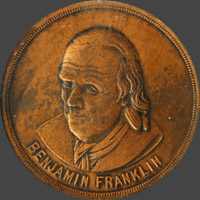
1909 Southern Electrical & Industrial Exposition
Louisville, Kentucky
The Southern Electrical & Industrial Exposition was the largest of several Louisville expositions promoting the use of electricity. The express purpose of the exposition was to show the South the possibilities of street lighting. One so-called dollar was struck in various compositions for this exposition. The details are cataloged in my 2023 book So-Called Dollars Volume I: United States Expositions. Click on the “View All” link below to see them.
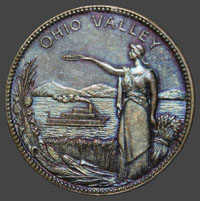
1910 Ohio Valley Exposition
Cincinnati, Ohio
The Ohio Valley Exposition in Cincinnati promoted the businesses and industries of the Ohio Valley and the South. The government display, which included coining and printing machinery, was of special interest to so-called dollars collectors. A U.S. Mint press from the Philadelphia Mint struck commemorative medals in their exhibit. One so-called dollar was struck in various compositions for this exposition. The details are cataloged in my 2023 book So-Called Dollars Volume I: United States Expositions. Click on the “View All” link below to see them.
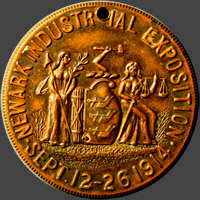
1914 Newark Industrial Exposition
Newark, New Jersey
The 1914 Newark Industrial Exposition continued a local practice promoting the industries of Newark, New Jersey. The 1914 event showcased one of Newark‘s chief industries, jewelry manufacturing.
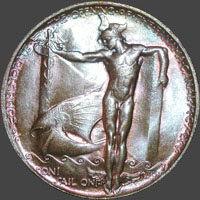
1915 Panama-Pacific International Exposition
San Francisco, California
San Francisco held it's second major exposition in 1915 to celebrate the completion of the Panama Canal and to let the world know that The City had recovered from the devastating 1906 earthquake and fire. 35 so-called dollars were struck in various compositions for this exposition. The details are cataloged in my 2023 book So-Called Dollars Volume I: United States Expositions. Click on the “View All” link below to see them.
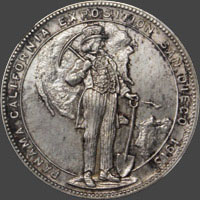
1915-16 Panama-California Exposition
San Diego, California
San Diego in 1915-16 hosted an exposition that was open during the same time as the exposition held in San Francisco. San Diego's exposition was extended for an additional year, into 1916, and also celebrated the completion of the Panama Canal. Thirteen so-called dollars were struck in various compositions for this exposition. The details are cataloged in my 2023 book So-Called Dollars Volume I: United States Expositions. Click on the “View All” link below to see them.
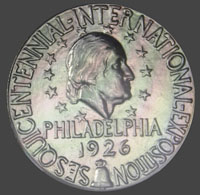
1926 U.S. Sesquicentennial Exposition
Philadelphia, Pennsylvania
Despite the challenges facing Philadelphia following World War I and the 1918 Spanish flu, plans to celebrate the 150th anniversary of the signing of the Declaration of Independence continued apace. Despite its goals and promises, the exposition closed on November 30, 1926 in debt and financially bankrupt. Philadelphia toyed with holding another exposition in 1976, but eventually declined without funding from the federal government. Five so-called dollars were struck in various compositions for this exposition. The details are cataloged in my 2023 book So-Called Dollars Volume I: United States Expositions. Click on the “View All” link below to see them.
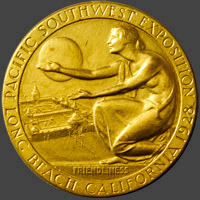
1928 Pacific Southwest Exposition
Long Beach, California
The Pacific Southwest Exposition had the express purpose of promoting commerce in the Pacific Southwest. Twenty-two nations were represented along the Avenue of Nations, each with their own representative architectural style. An amusement zone [the fun strip], and athletic stadium, and the ship café [yes, an actual ship] completed the exposition grounds.
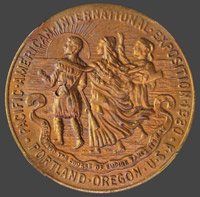
1930 Pacific American International Exposition
Portland, Oregon
Only one medal was issued privately in anticipation of this exposition which never took place. Planned during the roaring twenties with the intention to invite "all of the peoples of the globe". The Great Depression of latter 1929 proved the final blow and the exposition never occurred. One so-called dollar was struck for this exposition. The details are cataloged in my 2023 book So-Called Dollars Volume I: United States Expositions. Click on the “View All” link below to see them.
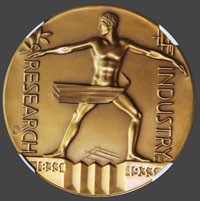
1933-34 Century of Progress Exposition
Chicago, Illinois
The Century of Progress International Exposition, with a paid attendance of 39,000,,000, was the largest exposition held in the United States as of that date. Also known as the Chicago World’s Fair, it was held in 1933 and 1934. The U.S. Mint had an exhibit where the official medal was struck. Twenty-Five so-called dollars were struck in various compositions for this exposition. The details are cataloged in my 2023 book So-Called Dollars Volume I: United States Expositions. Click on the “View All” link below to see them.
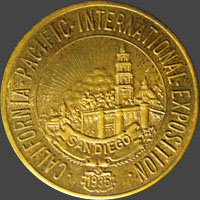
1935-36 California Pacific International Exposition
San Diego, California
In 1935-35 San Diego held a second major exposition in the same location, Balboa Park, to revitalize their community and to preserve and rebuild the structures originally built in 1915 for their previous exposition. Three so-called dollars were struck in various compositions for this exposition. The details are cataloged in my 2023 book So-Called Dollars Volume I: United States Expositions. Click on the “View All” link below to see them.
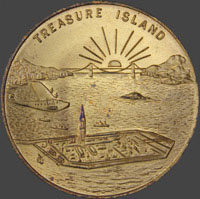
1939-40 Golden Gate International Exposition
San Francisco, California
The newly man-made Treasure Island was the location for the third and final major exposition held in San Francisco. The Golden Gate Bridge and the Bay Bridge had both just been recently completed and San Francisco wanted to host a celebration that would draw everyone to the city that was now readily accessible. Fourteen so-called dollars were struck in various compositions for this exposition. The details are cataloged in my 2023 book So-Called Dollars Volume I: United States Expositions. Click on the “View All” link below to see them.
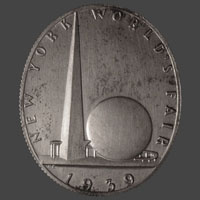
1939-40 New York World's Fair
New York City, New York
The 1939 New York World’s Fair was the first exposition to be based on the future, with a slogan “Dawn of a New Day” it allowed visitors to take a look at “the world of tomorrow.“ It open on April 30, 1939 in Queens with 209,000 people in attendance, to coincide with the 150th anniversary of George Washington’s inauguration as the first President of the United States. Albert Einstein gave a speech that discussed cosmic rays. When World War II officially began in September, five months after the fair open, many exhibits were affected. The Japanese pavilion featured a reproduction of the Liberty Bell, it also featured a photomontage mural with a motto “Dedicated to Eternal Peace and Friendship between America and Japan.“ Sadly this was just a few years prior to the surprise Japanese bombing of Pearl Harbor. Eight so-called dollars were struck in various compositions for this exposition. The details are cataloged in my 2023 book So-Called Dollars Volume I: United States Expositions. Click on the “View All” link below to see them.
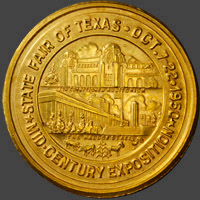
1950 Texas Mid-Century Exposition
Dallas, Texas
In 1950, the Texas State Fair promoted what they referred to as a Mid-Century Exposition. A State Fair is not usually considered an exposition, but in this case, since the medal structure for the event specifically states “Exposition” it is being catalogued is a medal related to an exposition. Like virtually all expositions, the Mid-Century Exposition featured a midway with amusement attractions, as well as exhibits related to the progress made in Texas as of the middle of the 20th century.
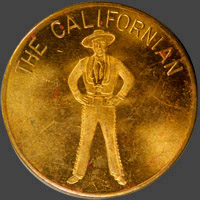
1954 California State Fair and Exposition
Sacramento, California
In 1954 this medal was struck to commemorate the 100th anniversary of the first State Fair held in California. A State Fair is not usually considered an exposition, but in this case, since the medal struck for the event specifically states the word Exposition, the “California State Fair and Exposition,” it is being catalogued as an exposition related so-called dollar. The 100 year anniversary exposition showcased the states fruits, vegetables, flowers, grain, and livestock. The latest developments in farming machinery and agriculture were demonstrated.
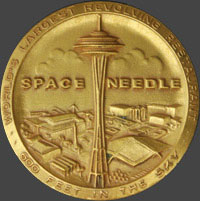
1962 Seattle World's Fair Exposition
Seattle, Washington
The aerospace industry was centered in the Pacific Northwest, specifically Seattle, and the U.S. was competing with the Russians in the space race to demonstrate technology superiority. Seattle was selected to host an exposition that would showcase the latest technological achievements made in the U.S. Twenty-Five so-called dollars were struck in various compositions for this exposition. The details are cataloged in my 2023 book So-Called Dollars Volume I: United States Expositions. Click on the “View All” link below to see them.
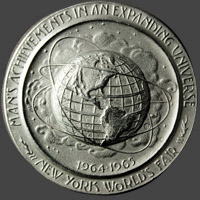
1964 New York World's Fair
New York City, New York
I, (Jeff Shevlin) remember, going to the 1964 New York World’s Fair when I was nine years old. It was an amazing place I will always remember. I saw life-size dinosaurs that actually moved that are now at Disneyland, Michelangelos Pieta, Walt Disney’s attraction “Great Moments with Abraham Lincoln” and “It’s a Small World”. 49,000,000 people attended the fair, giving it the largest attendance ever for an exposition until that time. Twenty so-called dollars were struck in various compositions for this exposition. The details are cataloged in my 2023 book So-Called Dollars Volume I: United States Expositions. Click on the “View All” link below to see them.
Browse So-Called Dollars by Decade Category
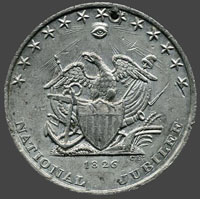
1820
So-Called Dollars from each decade will be cataloged in our next book "So-Called Dollars Volume II: United States Historical Events". Each decade has a handful of So-Called Dollars that are cataloged and depicted on this website, more will be added as the book nears completion.
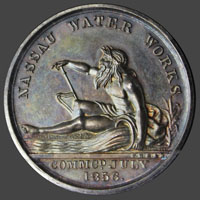
1850
So-Called Dollars from each decade will be cataloged in our next book "So-Called Dollars Volume II: United States Historical Events". Each decade has a handful of So-Called Dollars that are cataloged and depicted on this website, more will be added as the book nears completion.
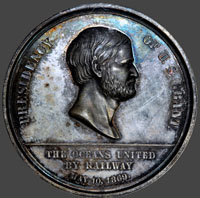
1860
So-Called Dollars from each decade will be cataloged in our next book "So-Called Dollars Volume II: United States Historical Events". Each decade has a handful of So-Called Dollars that are cataloged and depicted on this website, more will be added as the book nears completion.
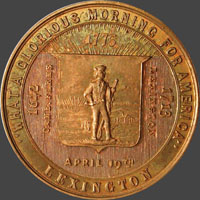
1870
So-Called Dollars from each decade will be cataloged in our next book "So-Called Dollars Volume II: United States Historical Events". Each decade has a handful of So-Called Dollars that are cataloged and depicted on this website, more will be added as the book nears completion.
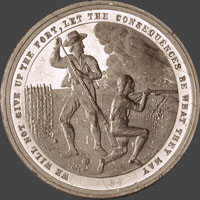
1880
So-Called Dollars from each decade will be cataloged in our next book "So-Called Dollars Volume II: United States Historical Events". Each decade has a handful of So-Called Dollars that are cataloged and depicted on this website, more will be added as the book nears completion.
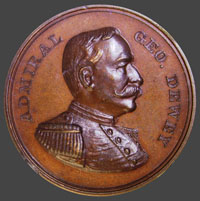
1890
So-Called Dollars from each decade will be cataloged in our next book "So-Called Dollars Volume II: United States Historical Events". Each decade has a handful of So-Called Dollars that are cataloged and depicted on this website, more will be added as the book nears completion.
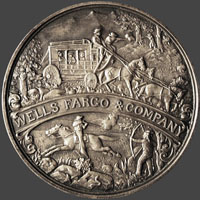
1900
So-Called Dollars from each decade will be cataloged in our next book "So-Called Dollars Volume II: United States Historical Events". Each decade has a handful of So-Called Dollars that are cataloged and depicted on this website, more will be added as the book nears completion.
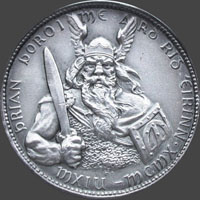
1910
So-Called Dollars from each decade will be cataloged in our next book "So-Called Dollars Volume II: United States Historical Events". Each decade has a handful of So-Called Dollars that are cataloged and depicted on this website, more will be added as the book nears completion.
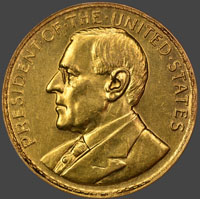
1920
So-Called Dollars from each decade will be cataloged in our next book "So-Called Dollars Volume II: United States Historical Events". Each decade has a handful of So-Called Dollars that are cataloged and depicted on this website, more will be added as the book nears completion.
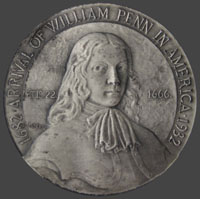
1930
So-Called Dollars from each decade will be cataloged in our next book "So-Called Dollars Volume II: United States Historical Events". Each decade has a handful of So-Called Dollars that are cataloged and depicted on this website, more will be added as the book nears completion.
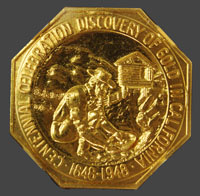
1940
So-Called Dollars from each decade will be cataloged in our next book "So-Called Dollars Volume II: United States Historical Events". Each decade has a handful of So-Called Dollars that are cataloged and depicted on this website, more will be added as the book nears completion.
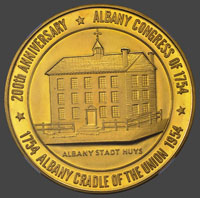
1950
So-Called Dollars from each decade will be cataloged in our next book "So-Called Dollars Volume II: United States Historical Events". Each decade has a handful of So-Called Dollars that are cataloged and depicted on this website, more will be added as the book nears completion.
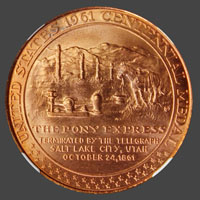
1960
So-Called Dollars from each decade will be cataloged in our next book "So-Called Dollars Volume II: United States Historical Events". Each decade has a handful of So-Called Dollars that are cataloged and depicted on this website, more will be added as the book nears completion.
Browse So-Called Dollars by Other Criteria
In addition to browsing by exposition or by decade on this page, you can also browse by several other criteria. We’ve compiled a helpful list of the various ways you can navigate our database, located on our Find A So-Called Dollar page.